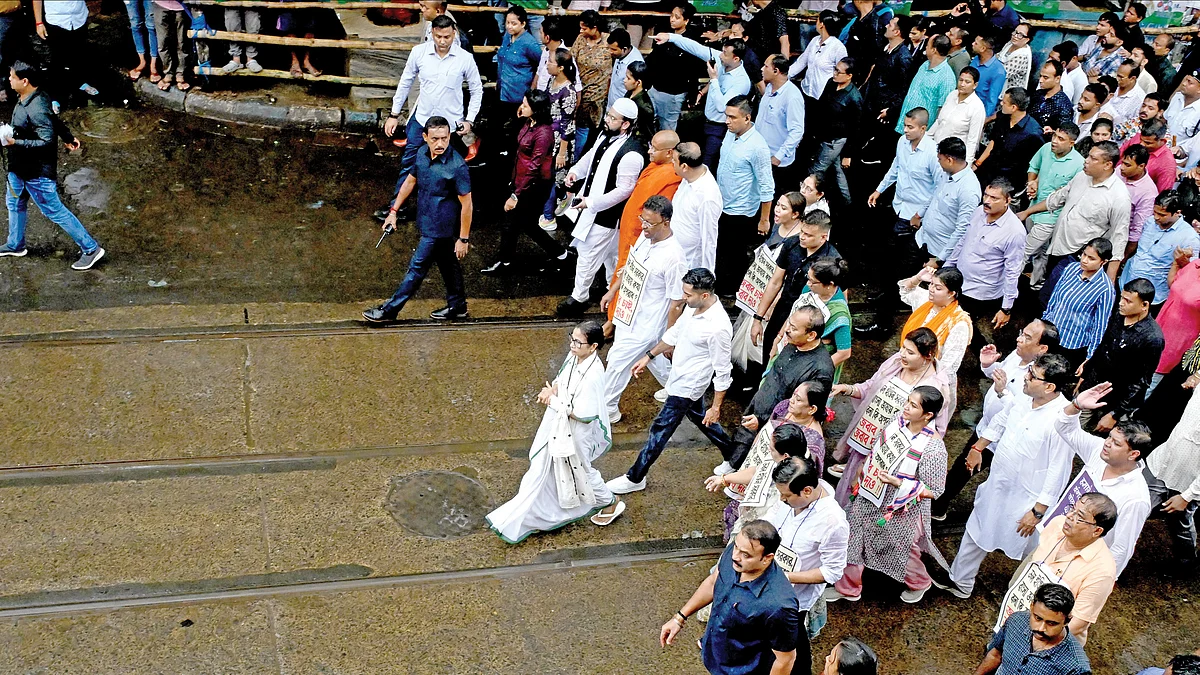Nation
…and now the SIRcus moves to Bengal
The TMC leadership has warned of massive protests if, under the guise of the SIR, a single voter’s name is unfairly removed from the rolls

West Bengal is next in line for the dreaded and now- discredited ‘special intensive revision’ of electoral rolls, also known as ‘SIR’. While the exact date is yet to be revealed, the BJP state unit has already coined the slogan ‘No SIR, No Vote’.
The Bengal BJP clearly believes a culled and curated voter list will give it a leg-up by reducing the percentage of votes that separate it from the ruling Trinamool Congress (TMC). In the 2021 assembly elections, the BJP had 38 per cent of the votes (for 77 seats) while Mamata Banerjee’s TMC had 48 per cent votes (but 213 seats).
Three years later, in the 2024 Lok Sabha elections, the BJP vote share was still 38.7 per cent (if down 2 percentage points from its 2019 Lok Sabha figures), while the TMC was still ahead with 45.8 per cent votes. The BJP’s spin on this vote difference is that the TMC wins on the strength of votes cast by Bangladeshi infiltrators. It also claims to have already submitted a list of 17 lakh fake voters, including said infiltrators.
The narrative backfired, though, when it turned out that many of these supposed infiltrators, who were forced back across the border, were in fact legal residents of West Bengal. The Calcutta High Court intervened and a proactive TMC cadre helped the banished Bengalis to return.
Published: undefined
***
India and Bangladesh have had a series of agreements — going all the way back to 1950 (the Liaquat–Nehru pact), followed by agreements in 1972, 1974 and one in 1982 (implemented in 1992) — to ease the movement and exchange of populations.
Published: undefined
While the 1950 and 1972 agreements dealt with broader population movements post-Partition, the 1974 Land Boundary Agreement (LBA) was the first to directly address the enclave issue confronting the two countries.
On 1 August 2015, India and Bangladesh formally exchanged 162 enclaves via another LBA. India transferred 111 enclaves (17,160 hectares) to Bangladesh, while Bangladesh transferred 51 enclaves (7,110 ha.) to India, ending the stateless existence of over 50,000 people living in these enclaves. These immigrants — not just Muslims but Dalit Hindus like the Matuas too, who are early migrants, long settled in West Bengal — find themselves caught in the crosshairs, arguing in vain that they were legally settled by Indian authorities and given Indian permits and identity cards.
***
These facts obviously don’t serve the BJP’s divisive narrative — and hence the ‘No SIR, No Vote’ campaign has the BJP workers all fired up.
“SIR is a process conducted by the Election Commission. Why is Mamata Banerjee so afraid of it?” asks BJP state president Samik Bhattacharya. It is impossible, he says, to deny the presence of infiltrators from Bangladesh. And while it was all very well for leaders like Jyoti Basu, Balasaheb Deoras and L.K. Advani to advocate a more humane approach to migration in search of livelihoods, that doesn’t mean “such people will appear in the voters’ list”, he says sanctimoniously.
Published: undefined
Meanwhile, the feisty opposition to the SIR continues, in the country’s highest court. TMC Lok Sabha MP Mahua Moitra, who is one of the petitioners, along with the Association for Democratic Reforms, says, “Nobody can oppose a revision in electoral rolls — that’s the job of the Election Commission. This exercise, though, is not about revision, but deletion and disenfranchisement of bona fide voters.
"The ECI is the BJP’s puppet, the CEC [a] spokesperson of the BJP. Instead of enquiring into legitimate queries, he threatens the Opposition and asks us to authenticate the EC’s own documents on affidavit. The EC has become a crazy circus!”
Published: undefined
It sees the exercise as an attack on Bengali identity and a violation of Constitutional rights. The memory of Amit Shah’s provocative speeches on the CAA and the NRC in Bengal (between 2019 and 2021) is still fresh enough to raise hackles.
Published: undefined
Another reason for the political slugfest to reach boiling point is an administrative face-off between the ECI and the state government. On 5 August, the ECI ordered the suspension of two West Bengal Civil Service officers and two assistant electoral registration officers and registered FIRs against them for ‘fraudulent registration of 127 voters using forged documents in Baruipur East and Moyna assembly constituencies’. A fifth individual, a data entry operator, was also accused by the ECI of ‘criminal misconduct’.
A week later, the state government wrote back stating that two of the officers had been withdrawn from election duty. However, initiating procedures (like FIRs) before a detailed inquiry ‘may be a disproportionately harsh measure’, they argued.
In response, the ECI summoned chief secretary Manoj Pant to Delhi to explain in person why action hadn’t been taken. On 13 August, Pant met the election commissioners and reportedly persuaded them to grant a week’s reprieve to seek legal opinion and to assess if Mamata Banerjee will up the ante.
The question that is now doing the rounds is: Can the ECI take action against state government employees before an election is notified?
Published: undefined
SOURABH SEN is a Kolkata-based independent writer and commentator on politics, human rights and foreign affairs
Published: undefined
Follow us on: Facebook, Twitter, Google News, Instagram
Join our official telegram channel (@nationalherald) and stay updated with the latest headlines
Published: undefined